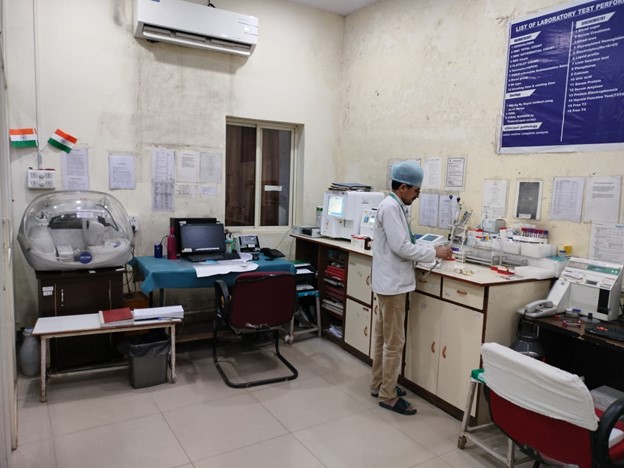- Home
- Departments
- Pathology

Pathology
Pathology is the medical discipline that provides diagnostic information to patients and clinicians. It impacts nearly all aspects of patient care, from diagnosing cancer to managing chronic diseases through accurate laboratory testing.
Overview
Pathology is the study of the causes and effects of disease or injury. The word pathology also refers to the study of disease in general, incorporating a wide range of biology research fields and medical practices.
- Cell Counter: A cell counter is a device used to automate the counting and analysis of cells in a biological sample, such as blood. It provides information about cell types, cell concentration, and cell morphology.
- Biochemistry Analyzer: A biochemistry analyzer is a laboratory instrument used to measure various chemicals and substances in biological samples, such as blood or urine. It helps assess organ function, detect metabolic disorders, monitor drug therapy, and diagnose diseases.
- Immunoassay: An immunoassay is a test that measures the concentration of specific substances (such as hormones, antibodies, or proteins) in a sample using the principles of immunology. It is commonly used to diagnose infections, autoimmune disorders, allergies, and various diseases.
- Electrolyte Analyzer: An electrolyte analyzer is a machine used to measure the levels of electrolytes (such as sodium, potassium, chloride, and bicarbonate) in the blood or other bodily fluids. It helps assess the body’s fluid and electrolyte balance, which is important for maintaining proper functioning of organs and tissues.
- RT-PCR (Reverse Transcription Polymerase Chain Reaction): RT-PCR is a laboratory technique used to amplify and detect the presence of specific RNA molecules, particularly RNA viruses like SARS-CoV-2 (the virus that causes COVID-19). It is commonly used for diagnosing infectious diseases, including viral infections.
- Microbiology: Microbiology is a branch of pathology that deals with the study of microorganisms, including bacteria, viruses, fungi, and parasites. Microbiology laboratories analyze specimens to identify and characterize pathogens, determine antimicrobial susceptibility, and diagnose infectious diseases.
- Cytology: Cytology is the study of cells, particularly their structure, function, and abnormalities. Cytology laboratories analyze cells obtained from various body fluids or tissue samples to detect cancer, assess the presence of abnormal cells, and aid in the diagnosis of diseases like cervical cancer or lung cancer.
These different components are essential for comprehensive diagnostic testing in a pathology laboratory, allowing healthcare professionals to analyze and interpret various aspects of a patient’s health and aid in disease diagnosis and management
Emergency Cases
Please feel welcome to contact our friendly reception staff with any general or medical enquiry call us.

